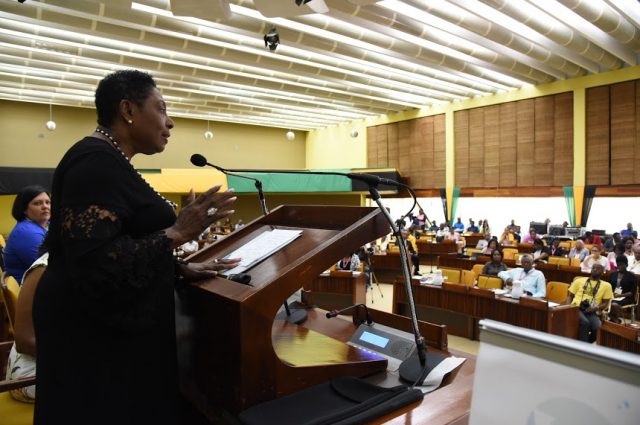DBJ Provides Assistance to Spur Growth in MSME Sector
As one of the principal agencies delivering the Government’s programme of micro, small and medium-sized enterprise (MSME) assistance, the Development Bank of Jamaica (DBJ) provides a diverse suite of products and services tailored to spur significant MSME growth.
General Manager for the DBJ’s Microfinance Services Division, Paul Chin, said the agency’s core functions fall under the areas of equity, micro-finance, loans, grants and capacity development, and responsibility for the Government’s Public-Private Partnership initiative.
Mr. Chin, who spoke at a recent SME Summit at The Knutsford Court Hotel in New Kingston, said the Bank’s achievements over the past three years include the approval and disbursement of loans totalling more than $20 billion, as well as the issuance of over 800 vouchers to 520 MSMEs for technical assistance.
He said the Bank’s resources targeted key strategic activities in agriculture/agro-processing, energy, infrastructure and technology, which, he pointed out, have enabled projects encompassing crops and livestock and construction and expansion, among others.
These, he added, have facilitated the creation of some 16,500 jobs across all MSME subsectors.
Mr. Chin said the DBJ partners with several Approved Financial Institutions (AFIs), which serve as intermediaries between the Bank and its clients.
These AFIs and intermediaries include commercial banks, equity fund managers, business service providers, and microfinance institutions.
The range of loan financing options include provisions for: agriculture, for which 90 per cent of the project funding cost, up to $10 million, is provided with up to 10 years for repayments, and up to two years moratorium on principal repayments; commercial energy loans, financing up to 90 per cent of the cost, up to a maximum of $30 million and up to 10 years for repayments; and residential energy loans (solar water heater installations and others), up to 90 per cent financing or $2 million.
Additionally, Mr. Chin indicated that loans are provided for large projects in the range of $100 million, which have a10-year maximum repayment period and up to 24 months moratorium on the principal repayment.
“We also provide US-dollar loans covering up to 75 per cent of project cost up to $5 million, with a maximum tenure of 10 years and up to 24 months moratorium on principal repayments,” he noted.
The DBJ’s suite of grants and capacity-development products is not only extensive but diverse.
These, according to Mr. Chin, include vouchers for technical assistance, energy audit grants, capacity-development grants, Jamaica business fund grants, and the Innovation Grant from New Ideas to Entrepreneurship (IGNITE).
The Credit Enhancement Facility (CEF), a programme of partial guarantees for businesses that have difficulty finding security, has “seen a lot of take up in recent times”, he said.
The General Manager revealed that the Voucher for Technical Assistance provides grants covering up to 70 per cent of the cost of the 27 business-development services being undertaken, ranging from $50,000 to $300,000.
These services include business-plan preparation, business-process improvements, marketing plans, financial statements, management consultancy services, and training courses, among others.
He advised that applications can be made either through a commercial bank or directly at www.dbjvoucher.com, adding that each MSME can access a maximum of two vouchers over two years.
Mr. Chin pointed out that the DBJ also provides grants of up to $200,000 to businesses to conduct audits “to determine whether or not (their) usage is what it ought to be”.
These audits, he pointed out, “usually work hand in hand with the loans we provide for energy”. Audit grants can be accessed without loans.
The General Manager disclosed that last year, the DBJ piloted the IGNITE programme which provides up to $4 million in grants through a call for expressions of interest from the public.
The IGNITE grant targeted businesses which have not been registered for longer than two years and have a viable business model and growth potential.
He explained that applications were made through business intermediaries, which resulted in 27 firms being shortlisted and awarded grants.
“Several of these small businesses have been able to increase their staff complement and sales, and some have gone into exporting to Caribbean markets where they never were before,” Mr. Chin informed.
He noted that the programme is working “pretty well,” based on the results of the assessments conducted in July, and that it is likely that a second call will be issued in 2018.
Under a World Bank-funded project, titled ‘Foundations for Competitiveness and Growth’, a grant facility known as the Jamaica Business Fund offers between US$20,000 and US$350,000 per supply chain to assist large businesses (known as ‘anchor firms’) in strengthening supply chain stakeholders, through the provision of between US$5,000 and US$30,000 to individual firms.
Meanwhile, Mr. Chin advised that the DBJ is exploring the possibility of establishing an SME Fund to provide equity funding directly to SMEs with investment target size ranging from US$500,000 to US$2 million.
Additionally, the DBJ is seeking to further address SMEs’ challenges in accessing funding, through the possible set up of a Factoring Platform to allow small suppliers to immediately receive payment for goods supplied.
This facility will assist with liquidity for businesses to reinvest in their next production cycle.
Source:
www.jis.gov.jm
Photo: Adrian Walker




